Related Research Articles

Major General Lachlan Macquarie, CB was a British Army officer and colonial administrator from Scotland. Macquarie served as the fifth Governor of New South Wales from 1810 to 1821, and had a leading role in the social, economic, and architectural development of the colony. He is considered by historians to have had a crucial influence on the transition of New South Wales from a penal colony to a free settlement and therefore to have played a major role in the shaping of Australian society in the early nineteenth century.

The Colony of New South Wales was a colony of the British Empire from 1788 to 1901, when it became a State of the Commonwealth of Australia. At its greatest extent, the colony of New South Wales included the present-day Australian states of New South Wales, Queensland, Victoria, Tasmania, and South Australia, the Northern Territory as well as New Zealand. The first "responsible" self-government of New South Wales was formed on 6 June 1856 with Sir Stuart Alexander Donaldson appointed by Governor Sir William Denison as its first Colonial Secretary.

John Macarthur was a British Army officer, entrepreneur, landowner and politician who was a highly influential figure in the establishment of the colony of New South Wales. He was also a pioneer of the Australian Merino wool industry, and was instrumental in agitating for, and organising, a rebellion against Governor William Bligh in what is now termed as the Rum Rebellion in January 1808.
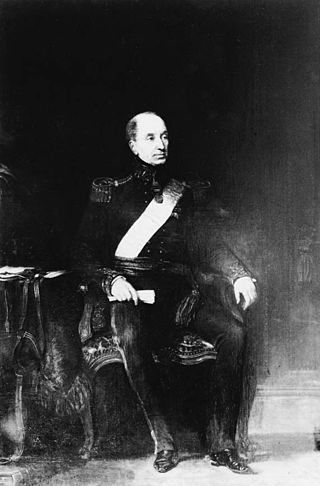
General Sir Ralph Darling, GCH was a British Army officer who served as Governor of New South Wales from 1825 to 1831. He is popularly described as a tyrant, accused of torturing prisoners and banning theatrical entertainment. Local geographical features named after him include the Darling River and Darling Harbour in Sydney.
Edward Wollstonecraft was a successful businessman in early colonial Australia, settling in what is now Sydney. He was the nephew of the early feminist Mary Wollstonecraft and cousin to Mary Wollstonecraft Shelley, the author of Frankenstein.
The history of Australia from 1788 to 1850 covers the early British colonial period of Australia's history. This started with the arrival in 1788 of the First Fleet of British ships at Port Jackson on the lands of the Eora, and the establishment of the penal colony of New South Wales as part of the British Empire. It further covers the European scientific exploration of the continent and the establishment of the other Australian colonies that make up the modern states of Australia.
The following lists events that happened during 1788 in Australia.
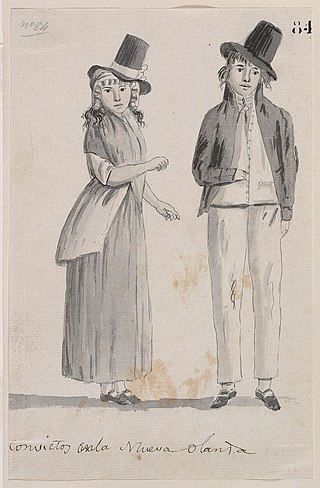
Between 1788 and 1868 the British penal system transported about 162,000 convicts from Great Britain and Ireland to various penal colonies in Australia.
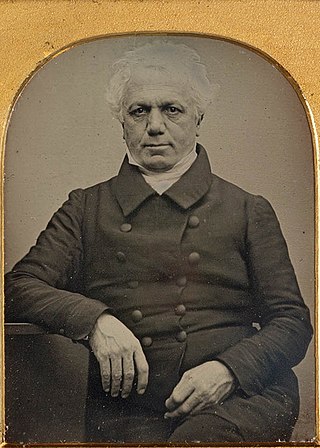
William Bland was a prominent public figure in the colony of New South Wales. A surgeon by profession, he arrived in Australia as a convict but played an important role in the early years of Australian healthcare, education and science.
The Supreme Court of Civil Judicature of New South Wales was a court established in the early 19th century in the colony of New South Wales. The colony was subsequently to become a state of Australia in 1901. The court had jurisdiction to deal with civil disputes where the amount in dispute in the colony was more than £50 sterling. The Supreme Court of New South Wales replaced the court in 1823 when the Supreme Court was created by the Third Charter of Justice.
Sir John Wylde was Chief Justice of the Cape Colony, Cape of Good Hope and a judge of the Supreme Court of the colony of New South Wales born at Warwick Square, Newgate Street, London.
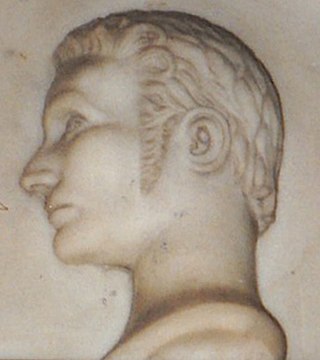
Robert Wardell was an English-born Australian barrister and newspaper editor.
Frederick Garling was an English attorney and solicitor, and was one of the first solicitors admitted in Australia and was regarded as the first senior solicitor of the second Supreme Court established in the colony of New South Wales. Garling is recognised as being one of the first Crown Solicitors in Australia.
Joseph Michael Leary, was an Australian politician and solicitor, serving as a member of the New South Wales Legislative Assembly.
The first Parkes ministry was the fourteenth ministry of the Colony of New South Wales, and the first of five occasions of being led by Henry Parkes.
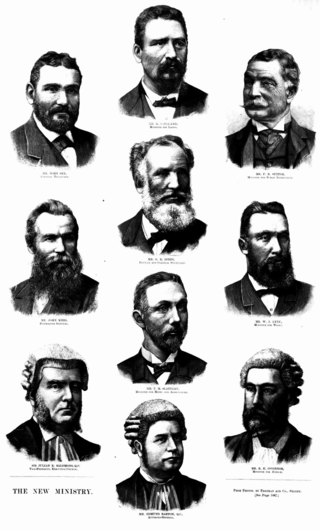
The third Dibbs ministry, the 27th ministry of the Colony of New South Wales, was led by Sir George Dibbs, leader of the Protectionist Party, following the 1891 New South Wales election, which saw the Labour Party win seats in the New South Wales Legislative Assembly and the balance of power. With no party having a majority, Sir Henry Parkes held on as Premier until October 1891 when he lost a vote in the Legislative Assembly, causing Parkes to resign as Premier and leader of the Free Trade Party. Dibbs formed the ministry on 23 October 1891, with Labour support, and comprised 10 ministers.
The New South Wales Crown Solicitor's Office (CSO) is an executive government agency of the New South Wales Department of Justice in Australia that has the role of providing legal services to the government, its agencies, and its statutory authorities. The Office practices in twelve areas of law, namely administrative law, child protection law, commercial law, community law, constitutional law, coronial law and inquiries, criminal law, employment law, government law, native title law, property law, and tort law. The Office frequently instructs barristers with regard to civil matters.
Alexander Macduff Baxter was a Scottish-Australian lawyer and politician who served as Attorney General of New South Wales between 1827 and 1831. The Governor of New South Wales, Sir Ralph Darling, considered him to be incompetent and tried to persuade the Colonial Office to dismiss him, but Baxter resigned in order to become a judge in Tasmania. In Tasmania, the Lieutenant-Governor, Sir George Arthur, managed to prevent Baxter from taking up his post. Baxter returned to England later in 1831 and died in 1834.
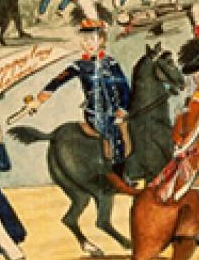
The Governor's Body Guard of Light Horse was a military unit maintained in the Colony of New South Wales between 1801 and 1834, and reputedly the "first full-time military unit raised in Australia". It was established by Governor Philip Gidley King by drawing men from the New South Wales Corps, the British garrison in the colony. Normally consisting of one or two non-commissioned officers and six privates, the Guard provided an escort to the governor and carried his despatches to outposts across the colony. From 1802, the men of the Guard were drawn from convicts pardoned by King. Men from the unit were deployed during the Castle Hill convict rebellion of 1804 and a trooper of the Guard assisted in the capture of two of the rebel leaders.

John Stephen (1771–1833) was appointed solicitor-general and judge of the Supreme Court of New South Wales in the Colony of New South Wales.
References
- 1 2 3 "Moore, William Henry (1788–1854)". Australian Dictionary of Biography. National Centre for Biography. Retrieved 15 July 2021.